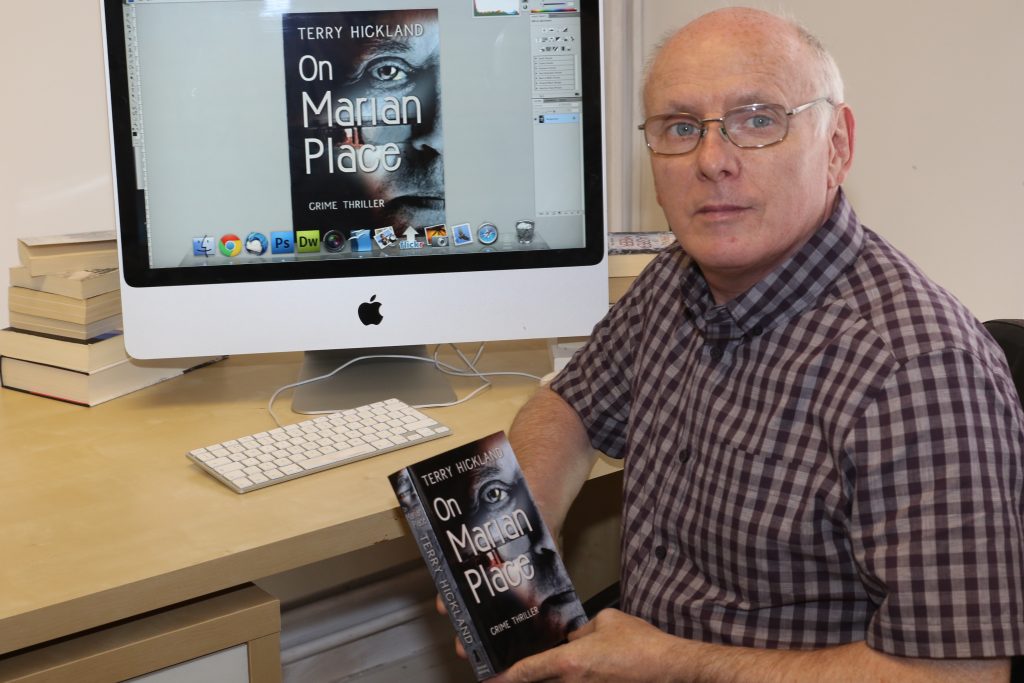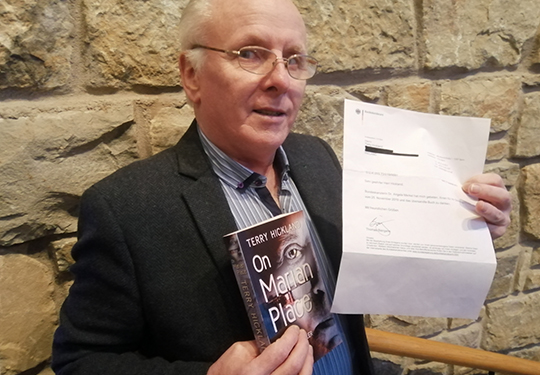It’s not everyday that you would get a letter from the German Chancellor Angela Merkel.
The paths of local author Terry Hickland who lives outside Ballynahinch and the German head of State crossed recently when Terry who is working on his second novel did some research into Frau Merkel’s background… and what he found out was an incredible coincidence.
Terry’s first crime thriller set in Germany in the post-was years. It is about a detective who uncovers the whereabouts of Nazi gold following a number of leads after finding a map hidden in an antique dresser in an old hotel at a lake near Berlin. The trails eventually leads to a bank in Munich where the plot truly thickens.

July 1954, in a Hamburg hospital in the then-West Germany, a girl was born into a Lutheran family. In 1957, she and her parents moved to East Germany as an infant when her father was offered a pastorate in the City of Perleberg in the Mecklenburg Von Pommern district of the Democratic Republic of Germany.
Later that year the family again relocated to the village of Templin. Some seven kilometres south of the village was the Großdöllner See and Wuckersee just east of Berlin. An extensive property on the shores of this huge inland lake was the former home and hunting lodge of Hermann Göring, Adolf Hitler’s Air Vice Marshall. Following her educational studies, Angela Merkel worked as a research scientist until 1989 and had close associations with the area.
January 1960 in a Hospital in Belfast, Terry Hickland was born into a working-class family from West Belfast. He was to grow up in very turbulent times as the Troubles raged throughout Northern Ireland and beyond.

On leaving school in the 1970’s, he trained as a heavy vehicle technician, before, leaving Ireland to further his career. He arrived in Germany in the early 1980’s, working for a number of companies including the Volkswagen Corporation. On returning to Northern Ireland he created various commercial enterprises before becoming a college lecturer and author.
Years later, unbeknown to them, the paths of Bundes Chancellor Dr Angela Merkel and author Terry Hickland would cross through his German crime thriller “On Marian Place”.
Editor: How did the connection with you and Dr Merkel come about?
Terry: Writing a period historical novel requires a lot of research for the product to be authentic enough for the reader to believe in it and to buy into the plot. The story begins north of Berlin, at a hotel situated on the shores of Großdöllner See, in the district of New Brandenburg east of Berlin. It was during this time that I discovered the chancellor had grown up in the area with her family.
Editor: How did you manage to contact one another Frau Merkel?
Terry: By sending a letter to her office in Berlin with a copy of my novel. I thought the co-incidences were uncanny and I just wanted to highlight my novel to her.
Editor: Did you ever consider adding a female president?
Terry: I have always admired Frau Merkel’s style of measured politics and her tactile measures of achieving her goals so I created Chancellor Bettina Herzfeld who host the novel’s G7 conference.
Editor: What drives you as a writer, Terry ?
Terry: I am passionate about any task I undertake… when an idea for a story or script comes to mind, it must engage the reader or viewers in the first instance then keep them captivated through the highs and lows of the plots.
Editor: What is your second novel about?
Terry: The Piano Boat is set in 1987 in rural Tipperary and is about a ten-year-old boy who lives above the shop with his parents. His ambition is to become an International road racer like his idols Stephen Roche and Sean Kelly. Those dreams are cut short by a tragic event. I hope to launch it this year.
Editor: What future writing plans do you have beyond ‘The Piano Boat’ novel.
Terry: I have had so many requests from people asking when the sequel novel to On Marian Place will be finished, so my goal now is to complete that work.
Editor: How important is scriptwriting to you?
Terry: I have written two television dramas and one film script which were submitted to National broadcasters. Scriptwriting can be very much pressure oriented, and I prefer the more sedate pace of writing novels.
Editor: Many thanks Terry. and good luck with the second novel.


























